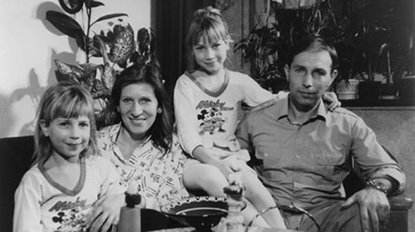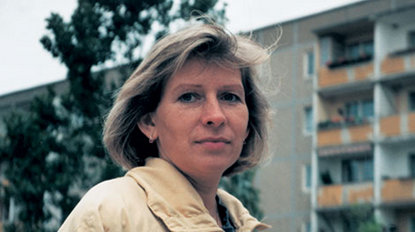This Is My Life - Marieluise of Golzow
Most British readers will be aware of 7 Up, Michael Apted’s documentary series about 14 British children, starting in 1964, when they were 7 years old (56 Up is expected in late 2011 or early 2012). However, it’s likely that they’re not aware of the East German version, Die Kinder von Golzow, which followed a class of children from that village who started school in 1961, not long after the Berlin Wall was constructed. The chronicle is more scattered than the Up series, with instalments being made about individuals and groups of the subjects as late as 2006, but as part of the BFI’s Towards a New Europe Part One: The Writing on the Wall, the 1996 film looking back on just one of the children, Marieluise, (This is My Life, or Da habt ihr mein leben Marieluise - Kind von Golzow) is being shown. I was lucky enough to see it on 7 October.
 |
As this is intended as a conclusion to Marieluise’s story, the film is from her point of view, as she watches previous segments of her life with her husband, and, sometimes, one or both of her daughters. We first see Marieluise as she is in 1996, then cut to film of her at school, where she brings herself to the attention of the film makers due to her intelligent and telling expressions during lessons. We soon find out that she is a bright and assertive child, with the source of that intelligence obvious when we meet her father, Walter Hübner. He is a Lutherian Christian, who reluctantly gave up his farm to a collective, and is employed as a milker, along with his wife, Elli. Much is made of his desire for a large family (Marieluise is the eldest of six), and his unhappiness with life in the GDR becomes obvious, much to his wife’s embarrassment. Although it’s tempting to laugh at him and his propensity to use religious dogma against socialist dogma, it’s interesting to see just quite how much he is able to express himself. The Western view of the Eastern European bloc is one of almost Stalinist conditions for the whole period of the Cold War, but of course, there were many different versions of the Socialist experiment, and the GDR, whilst repressive, could well have been described as one of the more liberal incarnations.
The difference of opinion in the GDR is aptly illustrated by Marieluise’s choice of husband. After seeing some charming footage of her teenage years, with her career decided by the steering of her by a teacher into chemistry (although she’s never really happy with this choice, having a more artistic bent), Marieluise marries at 23 to an army officer, Steffen Seidel. Steffen’s father is the polar opposite of Marieluise’s, as he is a member of the SPD and a good Socialist. Steffen’s occupation means that the Seidels are in a favoured position in the GDR, but it becomes clear, by the time the Seidels have their first child two years later, that the outspokenness of Mr Hübner is making life difficult for Steffen, causing him not to appear for most of the 1980s. Although Marieluise plays his absence down in these films, she admits in later years (after the fall of the GDR) that the reaction of Steffen’s superiors to her father did indeed mean that Steffen was pressurised not to appear.
 |
The extent to which this threatened their family is shown in their later relief that they didn’t cut ties with Marieluise’s parents in the 1980s, and it’s interesting that we are only shown this side of the family after 1990. Steffen explains that his father was badly affected by the GDR coming to an end, and in fact we don’t see anything of them after Steffen stops appearing in the early 1980s. Mr Hübner, on the other hand, is as inimical as ever, with his faith in his religion undiminished, and it’s reasonable to assume that although it caused him problems, it ultimately protected him through the upheaval of unification. It becomes even more interesting to see Steffen’s new career in the unified German army, as it appears to provoke a new-found enthusiasm for religion. Steffen’s embracing of religion as a basis for an ethical society does very much seem to be a desire to replace the Socialist values that he was brought up with.
Marieluise, however, is far more interesting than her husband, pleasant though he is. From her quizzical expressions in class at 11, her independent spirit as a young woman and her musings on the failure of the GDR in early middle-age, she never fails to be perceptive and wise. Her lack of mourning for the old system is unsurprising when you consider that she was never a particularly ‘good socialist’ (she attended a coming-of-age ceremony merely as an ‘observer’), and her family background, although she rejects it, means she was a natural spokeswoman for her work colleagues in the few opportunities she was provided by the GDR to express herself. Her self-confidence and independence serve her well when the GDR crumbles, and when shown round her old workplace, a victim of capitalism, she simply says that she saw both the failure of the company and the GDR coming for many years. One thing sticks out in the 1990 film: both her and Steffen hope for a third way between socialism and West Germany’s market economy, which I feel represents the hopes of many East Germans of the time, seeing the positive aspects of both systems and being acutely aware that market economics may well create winners, but that there will inevitably be losers: and most of them probably on their side. Luckily for the Seidels, Steffen gets a posting to Cologne, which gives them their first house, and an optimistic ending to the film. Marieluise describes it, fascinatingly, as the Seidels finally coming to Germany.
The other BFI showing of this film is this Sunday, 11 October: if you can see it, do.
![]()
About this entry
- By Tanya Jones
- Posted on Thursday, October 08 2009 @ 7:31 pm
- Categorised in Film, Review
- Tagged with winfried junge, GDR, defa
- 5 comments

That sounds a really interesting series.
I’ve always loved 7 Up. Well, since I’ve been old enough.
By vanderkerkoff
October 09, 2009 @ 8:40 pm
reply / #
It was a fascinating film, and it’s a shame that the series doesn’t seem to be on DVD release: just one VHS, from what I can see.
By Tanya Jones
October 10, 2009 @ 5:37 pm
reply / #
An interesting perspective on the fall of the GDR here: http://www.guardian.co.uk/commentisfree/2009/nov/0…
By Tanya Jones
November 08, 2009 @ 2:07 pm
reply / #
Hello Tanya,
just found your very interesting review of this unique documentation.
I had the chance to see a few of the installments of the Golzow series some years ago when they were run on German TV during evening/night hours. I have been to the Golzow Museum, too. It’s situated in a former school in the village near the eastern German border. (see http://www.kulturserver.de/-/organisationen/detail…)
I think you got something wrong in the movie, you say “Steffen’s father is the polar opposite of Marieluise’s, as he is a member of the SPD and a good Socialist” and you’re linking to the SPD on wikipedia.
Im 99% sure that it must be the SED you are referring to, the “Sozialistische Einheitspartei Deutschlands” which means Socialist Unity Party of Germany.
Also, there is a book in German about the Golzow documentation project and the persons involved called “Lebensläufe - Die Kinder von Golzow”.
And there are 3 DVD boxes covering every single one of the series parts up to the year 2007 when it was finished. See German wikipedia for the titles of the single episodes: http://de.wikipedia.org/wiki/Die_Kinder_von_Golzow
The DVDs are available via jpc.de or amazon.de and even amazon.co.uk lists Kinder von Golzow Box 2 which contains “Da habt Ihr mein Leben. Marieluise - Kind von Golzow.”
Did you watch a version with subtitles? Because the DVDs seem to be without subs. (I don’t own them yet.)
Best regards
ina from Germany
By ina
November 29, 2009 @ 1:25 am
reply / #
Thanks for the comment, Ina! I did try and check that the SPD was the right party, but I think I probably got confused with post-reunification, so sorry about that. I only had my own memory rather than a DVD to refer back to! I also searched for a DVD release, but no doubt my limited German let me down, so many thanks for the link.
It was a UK showing of the film, so, yes, subtitles were a must. I am trying to re-learn German, so perhaps I’ll buy the DVDs when I’m more confident, if they don’t have subtitles.
By Tanya Jones
November 29, 2009 @ 8:13 pm
reply / #